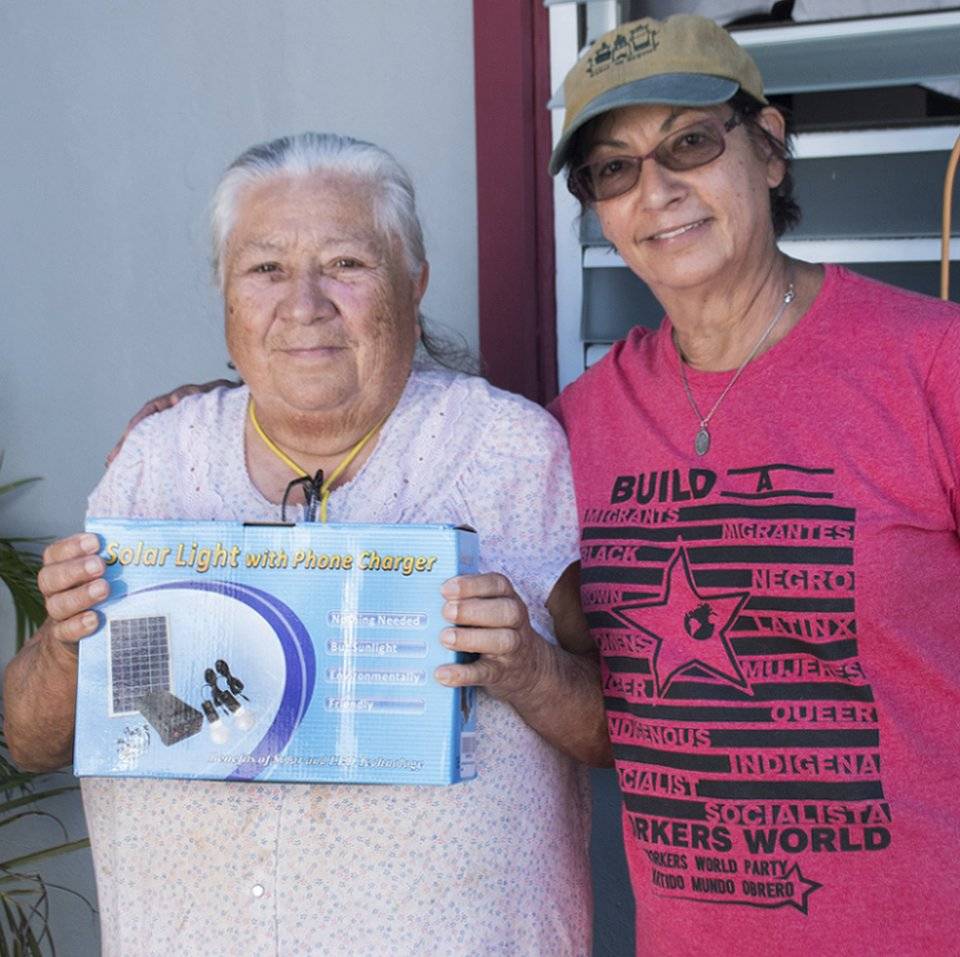

Mundo Obrero editor Berta Joubert-Ceci provides solar charger to Utuado resident in Puerto Rico.
Nov. 12 — Access to electricity has been fundamental to modern life since the beginning of the 20th century, yet 75 percent of the people of Puerto Rico have had to live without electric power for over six weeks, after two hurricanes in succession.
First, Hurricane Irma struck on Sept. 7, knocking out electricity for 1 million residents. Then, on Sept. 20, Maria dealt a body blow to the island, ending electric power for all its residents.
As part of a Nov. 1- 7 Solidarity Brigade to Puerto Rico, four members of the Philadelphia branch of Workers World Party experienced what it means to be without electricity when they landed in San Juan, a modern seaside city with tall buildings, expressways and a beautiful, historic section. The majority of people and businesses there have no lights, except from candles, flashlights or noisy and expensive generators.
When it grew dark, the sound of generators in the neighborhood where we stayed made it hard to sleep, but it was hot and we had to keep the windows open anyway. Of course, no power meant no air conditioning.
Refrigerators and freezers couldn’t function, affecting what people could eat and drink. Without working traffic lights, drivers contend with perilous intersections. Restaurants and other businesses must close at dark, if they open at all, adding to Puerto Rico’s already high unemployment rate.
Without power for television or cell phones, communication is difficult. Many health and sanitation systems cannot function unless they have expensive generators. More than six weeks after the storms hit, many schools remain closed.
People power plus solar power
Before our brigade left for Puerto Rico, we collected over 300 pounds of supplies. Besides medicines, batteries, flashlights and food items, our bags were stuffed with 18 solar kits costing $69 each, donated by members of the Calvary Center for Culture and Community and other supporters. The solar-powered kits include two lights, plus a USB port capable of charging cell phones.
Many Puerto Rican community, union, youth, religious and other groups are volunteering their time and resources to deliver supplies and other assistance to neighborhoods and villages hit hard by the disaster.
We wanted the solar panels to go to people with the greatest need. Assuming that electricity will be restored in San Juan before isolated communities, we drove 65 miles to Utuado, located in the central mountainous region known as La Cordillera Central. The name of this Spanish colonial town, built in 1739, comes from the native Taíno word “otoao,” which means “between mountains.”
There, we hooked up with a religious group of about 30 energetic puertorriqueños/as who had accumulated a truckload of groceries and cases of water to distribute to area residents. With vehicles full of supplies and people, three of the Philadelphia brigadistas walked up the steep mountain roads alongside other participants.
After catching up to the vehicles at the top, we spent several hours slowly walking down the mountain, stopping at homes along the way to see what supplies were needed and if people required any medical aid from two nurses in our group.
Families with no electricity or generator were offered a solar kit. The first family we encountered included an older woman who had just moved in with her son. She pointed out her home, 100 feet downhill, which was wrecked during Hurricane Maria. She had spent two nights there before being finally rescued.
As we handed out solar kits to families, we noticed some homes had blue tarp roofs replacing permanent roofs destroyed by wind and rain. We gave a family with a leaky tarp a new one donated by people in Philadelphia.
The hurricanes were called a natural disaster, but the failure of the U.S. government to restore electricity to Puerto Rico is a human-made calamity. Many people, however, are organizing their own bottom-up relief efforts without any government involvement. That movement of person-to-person aid holds a promise of future political solidarity beyond sharing food, water and solar panels.
Raposo is a Portuguese Marxist analyst, editor of the web magazine jornalmudardevida.net, where this article…
By Alireza Salehi The following commentary first appeared on the Iranian-based Press TV at tinyurl.com/53hdhskk.…
This is Part Two of a series based on a talk given at a national…
Educators for Palestine released the following news release on July 19, 2025. Washington, D.C. Educators…
On July 17, a court in France ordered the release of Georges Abdallah, a Lebanese…
The following are highlights from a speech given by Yemen’s Ansarallah Commander Sayyed Abdul-Malik Badr…